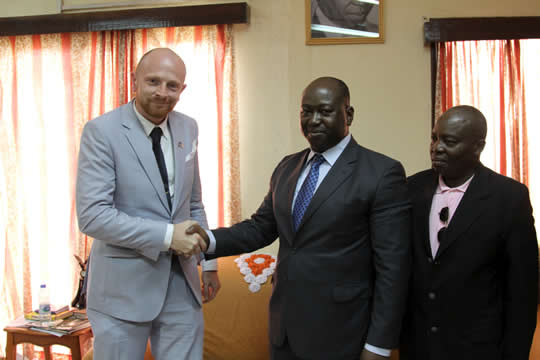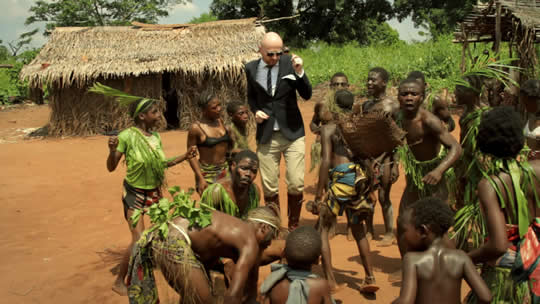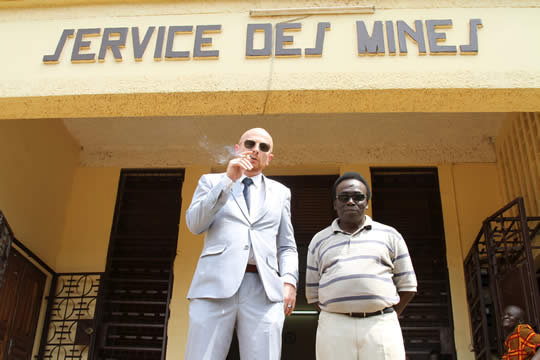 The Ambassador is a darkly comic, genre-bending documentary that exposes the corrupt business of selling diplomatic titles to exploit the lucrative and limited resources of war torn, third world nations. Filmmaker/journalist/provocateur Mads Brügger (Sundance Grand Jury Prize winner for Red Chapel) uses humor in his jaw-dropping descent into one of the most dangerous places on the planet: Central African Republic.
The Ambassador is a darkly comic, genre-bending documentary that exposes the corrupt business of selling diplomatic titles to exploit the lucrative and limited resources of war torn, third world nations. Filmmaker/journalist/provocateur Mads Brügger (Sundance Grand Jury Prize winner for Red Chapel) uses humor in his jaw-dropping descent into one of the most dangerous places on the planet: Central African Republic.
Bijan Tehrani: How did you come up with the idea of making The Ambassador?
Mads Brügger: I had this ambition to make a very different documentary about Africa, a film that would deviate as much as possible from the typical documentary about Africa, because most of them look alike and they are unbearable to watch. They are like pornography of suffering and I thought that if I could approach this continent from a different angle, then people would take interest in Africa again. I discovered a diplomatic title program and I thought that if this was possible and if I could become a diplomat I would get access to the inner sanctuary of power in that state where I would be able to meet and document and expose the kingpins and the wheelers and dealers who live a very comfortable and secretive life within the circles of power and these are people you never get to meet normally and that was my initial idea.
BT: Both of your previous projects also deal with important topics but I know that this one got you in trouble with a government.
MB: Not much happened, Liberian government wanted me to extradite and arrested, but nothing like that is going to happen and Denmark is not going to send me to Liberia for sure, I feel pretty safe.
BT: There is something amazing with how Denmark filmmakers in general deal with the taboos of today’s world without any fear.
MB: Yes, Danish people have problems with authority in general. 
BT: How challenging was it to shoot this film?
MB: Of course it was quite a challenge but parts of it were surprisingly easy compared to how difficult I thought it would be. We were using hidden cameras and microphones but some of the scenes are shot out in the open. My cameraman was using a canon US camera which looks like a still camera and I told people that he was my press officer. Because “Press Officer” sounds very official and impressive, therefore everybody thought that he was shooting still pictures and hence we were able to get a lot of situations that on paper would be impossible to document.
BT: The style of the film is very interesting; it reminds of the top French cinema verite films. How has the audience reaction been to the film so far?
MB: In general people have been very enthusiastic and appreciative, but this film is a divider, some people are also angry about the film, if everyone loved the film then I would find that a problem because I do not like to please everyone.
BT: You are dealing with issues that a lot of people are cautious to talk about. How much of your film is based on facts?
MB: I am coming from a field of journalism so I did my best to research and scrutinize everything in the film as well as possible, I did a lot of fact checking and so on and these types of governments do exist.
BT: How do you relate your three films to one another? MB: There are some similarities, first of all I am present within the films, it is extreme role playing I am working within places where journalism is not allowed, hence I am not appearing as a journalist. In some ways there are also differences, in The Red Chapel I am there with very gifted and very challenging comedians, and in the ambassador I am there on my own.
MB: There are some similarities, first of all I am present within the films, it is extreme role playing I am working within places where journalism is not allowed, hence I am not appearing as a journalist. In some ways there are also differences, in The Red Chapel I am there with very gifted and very challenging comedians, and in the ambassador I am there on my own.
BT: What is your next project?
MB: The next film I am working on is together with another Danish director it is a feature length documentary which is about the mysterious death of a high ranking European official, its a who did it murder mystery within the hallways of the European Commission.
BT: How much do you think The Ambassador can help resolve the issue at hand, because when you watch a film like The Ambassador you wonder how a film like this could not have an effect on the subject of fake diplomats?
MB: I do believe The Ambassador is having effects already, in Liberia now the media have begun scrutinizing the entire Liberian consulate and all of their diplomats and they have identified 8 ambassadors at large who resemble Mr. Corsin who are shady people and have bought their titles and I think that proves the film to be a cause of change for the better.
THE AMBASSADOR is playing at the Cinefamily In Los Angeles until this Thursday, September 6 and is available on iTunes and VOD.

